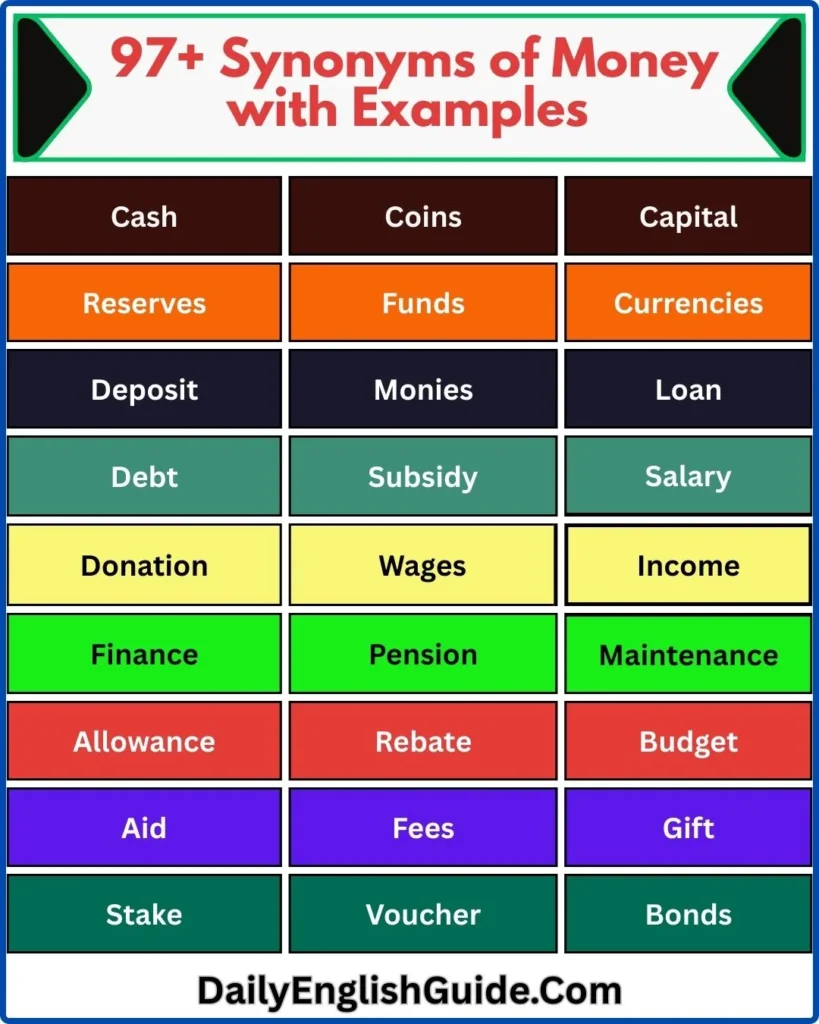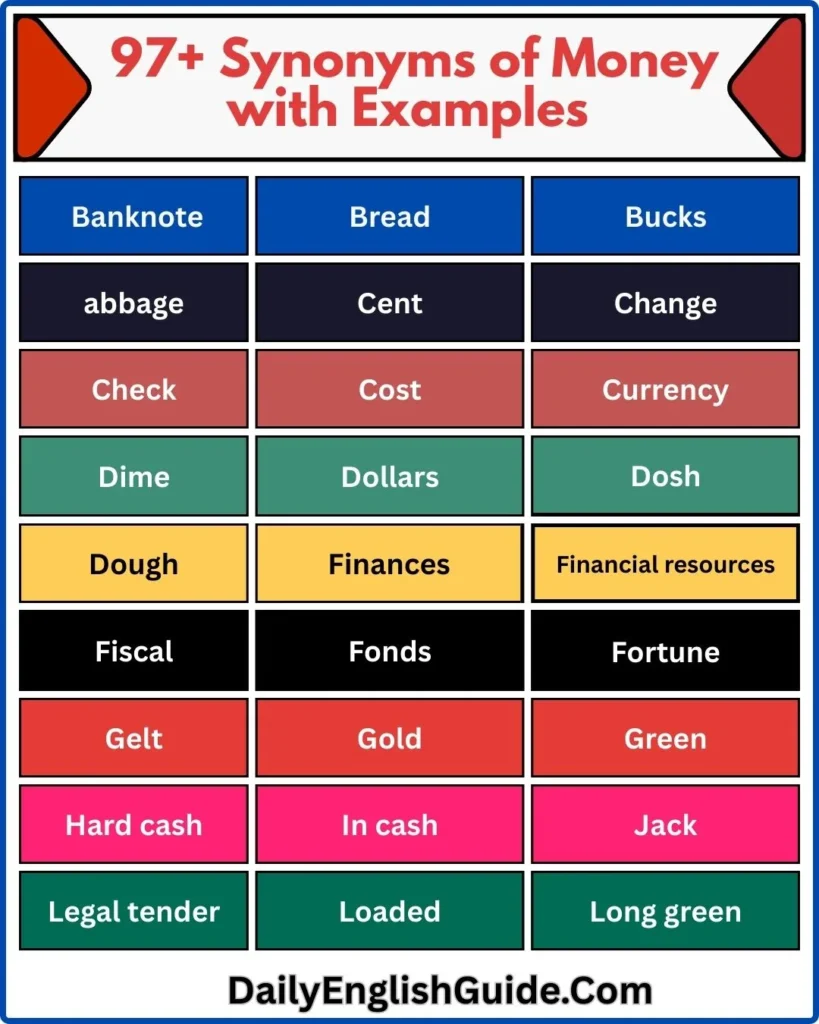Money is central to human life, influencing everything from personal finance to global economics. Because of its importance, the English language offers a wide variety of words to describe money, whether you’re referring to physical cash, digital currencies, or financial resources. Understanding the numerous synonyms for money can enrich your vocabulary, help you communicate more effectively, and bring precision to your writing.
In this article, we will explore over 97 synonyms for money, breaking them down into categories based on their usage, meaning, and context. Whether you’re a student looking to expand your vocabulary, a writer seeking more creative ways to describe financial terms, or just someone curious about the vast array of ways to express the concept of money, this guide will help you navigate through the many options available.
What Is Money?
“Money” refers to a medium of exchange, a measure of value, or a means of payment used for transactions. It is customarily and legally recognized for buying goods and services, saving, or investing. Money can exist in many forms, including physical currency, coins, digital transfers, and virtual money like cryptocurrencies.
Examples:
-
Managing your money wisely is crucial for financial stability.
-
They donated a large sum of money to the charity.
-
I’m trying to budget my money more effectively.
Understanding the various ways we refer to money can add precision to your writing and help you tailor your language to different contexts. Some terms are more formal, while others are colloquial or related to specific situations, such as investments, salaries, or digital transactions.

Full List of Synonyms for Money
Below is a comprehensive list of 97+ synonyms for money. These terms can be categorized based on the context in which they are used, such as physical currency, financial resources, and slang expressions. The table provides a quick reference for different types of money-related vocabulary.
| Cash | Coins | Capital |
| Reserves | Funds | Currencies |
| Deposit | Monies | Loan |
| Debt | Subsidy | Salary |
| Donation | Wages | Income |
| Finance | Pension | Maintenance |
| Allowance | Rebate | Budget |
| Aid | Fees | Gift |
| Stake | Voucher | Bonds |
| Shares | Gilts (UK) | Notes (UK) |
| Cheque (UK) | IOU | Amounts |
| Appropriations | Assets | Back |
| Banknote | Bread | Bucks |
| Cabbage | Cent | Change |
| Check | Cost | Currency |
| Dime | Dollars | Dosh |
| Dough | Finances | Financial resources |
| Fiscal | Fonds | Fortune |
| Gelt | Gold | Green |
| Hard cash | In cash | Jack |
| Legal tender | Loaded | Long green |
| Loot | Lucre | Means |
| Medium of exchange | Monetary | Moneys |
| Necessary funding | Paid | Paycheck |
| Pelf | Penny | Price |
| Property | Purse | Quarter |
| Readies | Ready | Resource |
| Scratch | Shekels | Silver |
| Specie | Spend | Sums |
| Treasure | Value | Wampum |
| Wealth | Wherewithal | Worth |
Types of Synonyms for Money
Synonyms for money can be categorized based on their form (physical or digital) or the context in which they are used (personal finance, business, slang). Understanding these distinctions will help you choose the most suitable synonym based on your need.
Physical Currency
These synonyms refer to tangible forms of money, such as banknotes and coins.
-
Cash – Physical money, such as coins and paper currency.
-
Example: He always carries some cash for emergencies.
-
-
Coins – Metal currency, typically used for smaller denominations.
-
Example: She counted the coins in her pocket, unsure if she had enough for the bus fare.
-
-
Banknotes – Paper money issued by the government.
-
Example: He paid the bill with a stack of banknotes.
-
-
Currency – The system of money in general use in a specific country.
-
Example: The currency in Japan is the yen.
-
Digital Currency and E-Money
As digital payments and online transactions become more common, new terms for money have emerged, especially in the context of cryptocurrencies and electronic transfers.
-
Cryptocurrency – A digital or virtual currency using cryptography for security, such as Bitcoin or Ethereum.
-
Example: She invested a portion of her savings in cryptocurrency for long-term growth.
-
-
Virtual currency – A type of money used in online gaming or digital services.
-
Example: The game allows you to purchase virtual currency for in-game items.
-
-
Digital cash – A form of money that exists in electronic form, often used for online transactions.
-
Example: Some online retailers accept digital cash through apps like PayPal.
-
-
E-money – Refers to money stored electronically, often for use in online transactions.
-
Example: E-money allows for fast and secure online payments without needing physical credit cards.
-

Financial Resources and Business Terminology
In business and finance, the terms used to describe money often reflect the purpose or the way it is used.
-
Capital – The wealth or assets used for investment or business operations.
-
Example: The company raised capital to expand into new markets.
-
-
Funds – Money set aside for a specific purpose or project, often used in formal or institutional contexts.
-
Example: The school received additional funds for the renovation of the library.
-
-
Finance – The management of large amounts of money, especially by governments or large companies.
-
Example: She works in finance, managing portfolios for high-net-worth individuals.
-
-
Assets – Any valuable resource, including money, property, and investments.
-
Example: Real estate is one of the most common assets that wealthy people invest in.
-
Common Synonyms for Money
When looking for alternatives to the word “money,” it’s important to understand how context influences the choice of synonym. Here are some common synonyms and their contextual meanings:
Money vs Currency
-
Currency refers specifically to the legal tender used in a particular country or region, typically issued by the government. It includes banknotes and coins that are used for transactions.
-
Example: I exchanged my dollars for euros at the currency exchange counter.
-
-
Money, however, is a broader term that encompasses all forms of exchangeable value, including digital currencies, checks, and other financial instruments.
-
Example: She transferred money from her bank account to pay the bill.
-
Money vs Cash
-
Cash refers specifically to physical forms of money, including paper money and coins, which can be held and exchanged directly.
-
Example: He withdrew some cash from the ATM to pay for the taxi fare.
-
-
Money, in a broader sense, includes cash but also refers to other forms like digital transfers, checks, and credit.
-
Example: I have money in my bank account and some cash in my wallet.
-
Money vs Coin
-
Coin refers to a small, round piece of metal, typically issued by a government as currency. It is often used in transactions for small amounts.
-
Example: He found a rare coin from the 19th century in his collection.
-
-
Money, however, includes all forms of currency, not just coins. This term can refer to digital transfers or banknotes as well.
-
Example: I keep my money in different accounts for saving and spending.
-
Synonyms for Money in Different Contexts
Different contexts call for different levels and kinds of money. Whether you’re writing creatively, expressing personal feelings, or describing a situation, using the right synonym can add emotional depth and precision.
In Literature and Creative Writing
Writers often use synonyms for “money” to evoke powerful emotional responses from their readers. Depending on the tone and context of the story, certain words will resonate more deeply with the audience. Below are some synonyms that are particularly effective in literature:
-
Dolorous – Used to describe a profound, sorrowful mood or atmosphere. It conveys a sense of deep sadness that is often present in melancholic or tragic narratives.
-
Example: The dolorous sound of the funeral bell echoed through the village, signaling the loss of the beloved leader.
-
-
Woebegone – A literary term used to describe someone who looks or feels deeply sorrowful, often with an element of despair.
-
Example: The woebegone figure wandered the streets, his face a reflection of the grief that consumed him.
-
-
Forlorn – Describes a feeling of abandonment or loneliness, often accompanied by sadness or isolation.
-
Example: The forlorn child sat on the steps, waiting for someone who never came.
-
In Grief and Loss
When someone is dealing with loss, the sadness they feel is often deep and long-lasting. Words that describe grief, mourning, and sorrow are especially important in such contexts.
-
Heartbroken – A very strong synonym for sadness that describes the intense emotional pain caused by loss, particularly in the context of love or personal relationships.
-
Example: He was heartbroken after his pet passed away unexpectedly.
-
-
Sorrowful – A term that reflects sadness caused by significant loss or grief, but can also refer to a reflective sadness when thinking about missed opportunities or other forms of deep emotional pain.
-
Example: She gave a sorrowful look as she said goodbye to her childhood home.
-
-
Bereaved – This term is used to describe people who are mourning the death of a loved one, often used in more formal or respectful contexts.
-
Example: The bereaved family found solace in their shared memories during the memorial service.
-
Slang Expressions for Money
Colloquial terms for money are often used in informal contexts. Here are some of the most common slang terms for money:
-
Dough – Slang for money, especially cash.
-
Example: I need to earn some extra dough to afford a vacation this summer.
-
-
Bucks – Another slang term for money, particularly dollars.
-
Example: He’s willing to pay big bucks for that vintage car.
-
-
Quid – Slang for money used in the UK, referring to pounds.
-
Example: Can you lend me a few quid until I get paid next week?
-
-
Green – Refers to U.S. dollars, often due to the color of the bills.
-
Example: I always carry some green in my wallet for emergencies.
-
Conclusion on Synonyms for Money
The English language offers an expansive collection of synonyms for money, ranging from formal terms like “capital” and “currency” to casual slang such as “bucks” and “dough.” Each of these synonyms has its specific meaning, context, and usage, giving you the ability to communicate about money more effectively and creatively. Whether you’re discussing personal finances, writing literature, or simply using casual expressions in daily life, understanding these alternatives will help you become more precise and versatile with your language.
By exploring this comprehensive list of synonyms, you can not only broaden your vocabulary but also learn to navigate through different contexts with ease, enhancing both your written and spoken communication.
